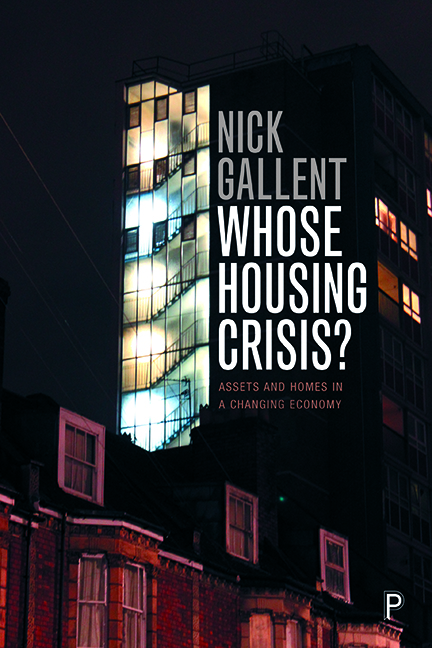1 - The housing crisis
Published online by Cambridge University Press: 27 April 2022
Summary
England is in the grip of a housing crisis marked by rising property prices, declining affordability (relative to workplace earnings), falling rates of homeownership and rising levels of long-term renting, homelessness and general housing inequality. London, where demand for residential property outstrips market supply and where price increases have been steepest, is undoubtedly the focus of this crisis. The purpose of this book is to examine the causes of this situation, and to explore the ways in which the mixed function of housing – as home and asset – shapes patterns of consumption, housing costs, and levels of affordability and general access. It does not reject the need, in many parts of England and across the UK, to build more homes. Housing supply, however, comprises not only new dwellings added to the total housing stock; rather, supply is a composite of new and secondhand housing. Therefore, in order to understand the factors shaping affordability and access – to all housing – it is necessary to examine both impediments to new build (including planning as an expression of local politics and attitudes towards development) and the reasons why housing across much of the market has become increasingly expensive, with prices decoupling from earnings in many areas and becoming increasingly unaffordable.
Housing affordability – a term often used but seldom clearly defined – expresses an important relationship between household earnings and housing costs (including associated travel costs if there is a dislocation between where a household resides and where its occupants need to work). Analytical, political and practical uses of the term have been reviewed in an article by Hulchanski (1995), which remains – in my view – one of the most important contributions to understanding the concept of affordability and the attendant politics surrounding its use. When housing is said to be affordable, the inference is that costs – to rent or buy – are reasonable relative to household earnings. What reasonable means is a political call: but it needs to be expressed as a proportion of net monthly earnings for rent and a multiple of yearly gross earnings for mortgage borrowing.
Figures from the Office for National Statistics (ONS) reveal that, in the 10 years between 2007 and 2017, the ratio (or multiple) of median house price to median gross annual workplace earnings in England rose from 7.15 to 7.91 (ONS, 2018a).
- Type
- Chapter
- Information
- Whose Housing Crisis?Assets and Homes in a Changing Economy, pp. 1 - 22Publisher: Bristol University PressPrint publication year: 2019



